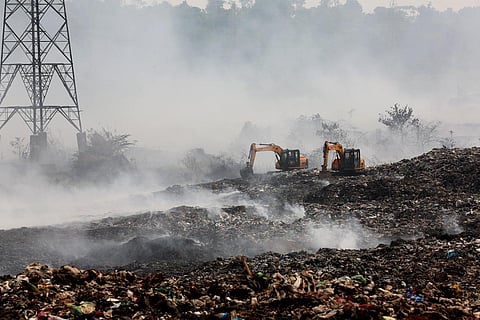

KOCHI: With residents in and around Brahmapuram continuing to face the hazardous smoke from the fire at the waste dump yard, experts have called for an independent probe into the fiasco to unearth the cause of the blaze and find if there were any shortcomings.
According to them, the long-term solution to Kochi’s garbage issue is going back to the roots by imposing a ban on plastic/non-degradable and popularising organic products such as cotton clothes and coir-based products wherever possible.
“What is needed is an independent probe commensurate with the magnitude of the catastrophe to find the cause of the blaze and to find if there were any shortcomings or pitfalls and inadequacies while handling the emergency situation,” said Justice Narayana Kurup, the former acting Chief Justice of Madras High Court. “We are yet to learn from the Bhopal incident, one of the worst industrial tragedies,” he said.
M M Abbas, one of the founders of Organic Kerala Charitable Trust, said the Brahmapuram waste plant should be declared an ‘environmental disaster’. “There’s nothing wrong with declaring Brahmapuram as an ‘environmental disaster’, and committees should be formed in the nearby local bodies in Ernakulam and Aroor to Cherthala in Alappuzha. We have nothing to lose by working in close cooperation with the state disaster management authority and the UN for analysing and taking remedial measures,” he said.
According to Abbas, the state has succumbed to the market forces, in allowing private companies to dump all sorts of plastic and other non-biodegradable products on the people. “We need to return to our traditional industries, which produce only organic products from coir foot mats, bamboo baskets, and coconut broomsticks,” he said. He said the two dynamic ministers P Rajeeve and M B Rajesh, who are handling key ministries – industries & coir, and local self-governance – should take the initiative to change our consumerist behaviour.
“There’s immense potential and scope to promote these industries,” Abbas, who is a promoter of biodiversity conservation and organic farming methods, told TNIE. Ajit Mathai, the founder of mByom, a consultancy, said Kerala, which is blessed with coconut, can use raw coir pith, procured by the local bodies, for solid waste management.
According to him, coir pith is still an untapped source and could be used for organic waste recycling and converted to manure. The organic manure can then be sold to farmers at subsidised rates. “Local self-governments have a Rs 350 crore budget for solid waste management. This could be used for buying coir piths, making the coir sector phenomenally profitable,” said Mathai.
Meanwhile, Justice Kurup said the ‘precautionary principle’, which comes under the UN Framework Convention on Climate Change, advocates action to anticipate and avert environmental harm. It states that if there is a risk of severe damage to humans and/or the environment, the absence of incontrovertible, conclusive, or definite scientific proof is not a reason for inaction. In the Brahmapuram fire incident, the precautionary principle is breached, he said.
Only solution is going back to roots
The long-term solution to Kochi’s garbage issue is going back to the roots by imposing a ban on plastic/non-degradable and popularising organic products such as cotton clothes and coir-based products wherever possible.